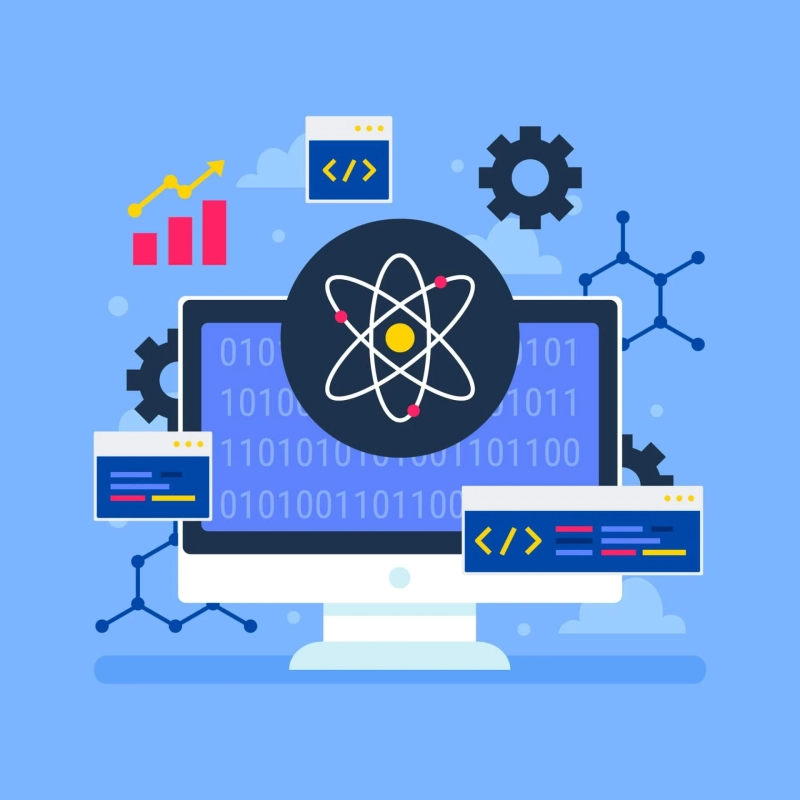Unlocking new frontiers: Quantum computing revolutionizes industries, accelerating innovation and transforming the way we solve complex problems.
The field of quantum computing aims to leverage the unique properties of quantum mechanics to perform complex computations exponentially faster than classical computers. While classical computers store and manipulate information in bits (0s and 1s), quantum computers utilize quantum bits or qubits, which can exist in multiple states simultaneously. This inherent parallelism allows quantum computers to tackle problems that would take classical computers an unreasonable amount of time to solve.
1. Understanding Quantum Computing
Quantum computing operates on the principles of superposition and entanglement. Superposition refers to the ability of qubits to exist in multiple states simultaneously, increasing the computational power exponentially. Entanglement, on the other hand, allows the correlation between qubits, enabling the transmission of information instantaneously over large distances.
2. Quantum Computing vs. Classical Computing
Classical computing has been the backbone of technological advancements for decades, but it has certain limitations when it comes to solving complex problems. Quantum computing, with its ability to perform parallel computations and harness quantum phenomena, offers a new approach to tackle these challenges. It can provide solutions to problems that were previously unsolvable or computationally infeasible.
3. Applications of Quantum Computing
3.1. Cryptography and Data Security
Quantum computing has the potential to disrupt cryptography, a cornerstone of data security. While classical computers can take years to crack certain encryption algorithms, quantum computers could break them in a matter of minutes or seconds. However, quantum cryptography techniques can also enhance data security by leveraging quantum properties such as quantum key distribution.
3.2. Drug Discovery and Healthcare
The pharmaceutical industry can greatly benefit from quantum computing. It can accelerate the drug discovery process by simulating molecular interactions and analyzing complex biological systems more efficiently. Quantum algorithms can provide insights into protein folding, helping scientists develop new drugs and understand diseases on a deeper level.
3.3. Optimization and Logistics
Optimization problems, such as route planning and resource allocation, are pervasive in various industries. Quantum computing's ability to explore multiple solutions simultaneously can revolutionize logistics and supply chain management. It can optimize delivery routes, minimize fuel consumption, and streamline operations, leading to significant cost savings and improved efficiency.
3.4. Financial Modeling and Risk Analysis
Quantum computing can enhance financial modeling and risk analysis by handling complex calculations involved in pricing derivatives, portfolio optimization, and risk assessment. It can enable more accurate predictions and help financial institutions make informed decisions in an increasingly volatile and interconnected global market.
3.5. Artificial Intelligence and Machine Learning
Quantum machine learning algorithms have the potential to outperform classical machine learning models in specific applications. Quantum computing can speed up the training process for complex neural networks, improve pattern recognition, and enable more efficient data clustering, leading to advancements in various AI-driven industries.
3.6. Weather Forecasting and Climate Modeling
The complex and chaotic nature of weather patterns requires immense computational power for accurate forecasting. Quantum computers can process vast amounts of data and simulate weather systems with increased precision, enabling better predictions and early warning systems for severe weather events. Moreover, quantum simulations can contribute to climate modeling and aid in finding sustainable solutions to global environmental challenges.
3.7. Materials Science and Engineering
Quantum computing can revolutionize materials science and engineering by simulating the behavior of atoms and molecules with unprecedented accuracy. It can contribute to the discovery and design of novel materials with specific properties, leading to advancements in areas such as energy storage, electronics, and manufacturing.
3.8. Energy and Environmental Solutions
Quantum computing can play a significant role in developing sustainable energy solutions. It can optimize energy grids, analyze complex energy systems, and facilitate the discovery of new materials for renewable energy technologies. By addressing critical energy and environmental challenges, quantum computing can contribute to building a more sustainable future.
4. Challenges and Limitations
While quantum computing holds tremendous potential, there are several challenges and limitations that need to be overcome. These include the fragility of qubits, high error rates, and the need for precise control and cooling mechanisms. Additionally, the development of practical quantum algorithms and scalable quantum systems remains an active area of research.
5. Quantum Computing in the Future
As quantum computing continues to evolve, it has the potential to transform various industries and reshape the technological landscape. Advancements in hardware technologies, error correction techniques, and algorithm development are paving the way for practical quantum applications. The integration of classical and quantum computing systems, known as hybrid computing, may also provide scalable solutions for real-world problems.
Conclusion
Quantum computing is no longer confined to theoretical discussions but is rapidly making its way into practical applications across industries. Its potential to solve complex problems, optimize processes, and unlock new possibilities is truly remarkable. As we embrace this transformative technology, it is essential to address the challenges and limitations while exploring the vast opportunities it presents.
Frequently Asked Questions (FAQs)
Q1. How does quantum computing differ from classical computing?
A1. Quantum computing differs from classical computing by harnessing the principles of quantum mechanics, such as superposition and entanglement, to perform computations exponentially faster.
Q2. What are some practical applications of quantum computing?
A2. Quantum computing has applications in various fields, including cryptography, drug discovery, optimization, finance, artificial intelligence, weather forecasting, materials science, and energy solutions.
Q3. Can quantum computing break encryption?
A3. Quantum computing has the potential to break certain encryption algorithms that are used in classical cryptography. However, quantum cryptography techniques can enhance data security in the quantum era.
Q4. What are the challenges in realizing practical quantum computers?
A4. Some challenges in realizing practical quantum computers include maintaining qubit stability, reducing error rates, achieving precise control and cooling, and developing practical quantum algorithms.


